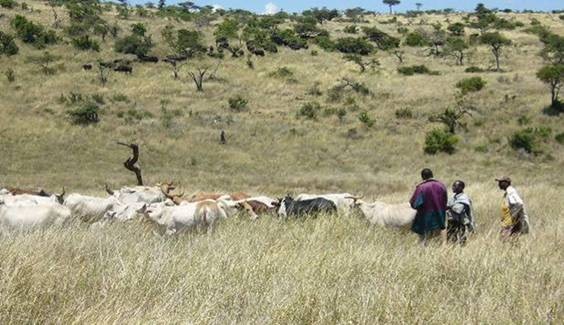- What We Do
- Agriculture and Food Security
- Democracy, Human Rights and Governance
- Economic Growth and Trade
- Education
- Ending Extreme Poverty
- Environment and Global Climate Change
- Global Climate Change
- Conserving Biodiversity and Forests
- Sustainable Urbanization for Global Progress and Security
- Securing Land Tenure and Property Rights for Stability and Prosperity
- Sustainable Land Management
- Environmental Impact Assessment
- Knowledge Management for Environment and Natural Resources
- Sustainable Tourism
- Earth Day
- Gender Equality and Women's Empowerment
- Global Health
- Water and Sanitation
- Working in Crises and Conflict
- U.S. Global Development Lab

Worldwide, land degradation and desertification due to deforestation, over-grazing, soil erosion, and unsustainable agricultural practices has accelerated. These conditions reduce productivity, and increase food insecurity, malnutrition, poverty, and conflict.
To meet human and ecological needs, competing demands for land and resources must be resolved. Food production must increase with minimal negative environmental impact.
USAID works in many countries to:
- Improve agricultural productivity and sustainability simultaneously.
- Restore productivity of degraded farmland and rangeland.
- Increase the ability to respond to disasters and climate change.
- Conserve and restore soil fertility, water quantity, and quality.
- Enhance communities’ capacity to manage natural resources and maintain healthy ecosystems.
Our long-term work in this sector has delivered tangible results, like the USAID-funded analysis of land cover change in the Sahel in Africa, which dentified a massive regreening of over 5 million hectares in Mali, Niger and Burkina Faso and resulted in:
- Adoption of rainfall harvesting technologies on more than a half-a-million hectares in the same countries.
- Farmers introduced to a form of agroforestry called Farmer-Managed Natural Regeneration in the 1980s expanding its use on their own.
- Increased productivity and strengthened resilience in large areas of the Sahel.
We work with host-country governments, institutions, and individuals to evaluate research, and analyze emerging technologies to strengthen land management, improve policies, integrate the use of satellite imagery and other data for decision making. We also use effective environmental education, advocacy, and communication to help change unhelpful practices.
By 2015, USAID will:
- Assist more communities to measure the carbon stored in trees and soil through improved forest management and rehabilitation of degraded forests, allowing them to increase their incomes by selling carbon credits in emerging carbon markets.
- Develop information management systems for soil, water and land cover health that enable communities to strategically target investments in rangeland rehabilitation and placement of small-scale water infrastructure.
- Help communities alleviate the impact of climate change through training in improved early warning systems and agricultural practices that reduce vulnerability to drought.
- Increase incomes by helping communities expand enterprises such as eco-tourism, sustainable forestry, and improved fisheries management.
These activities build on each other to achieve USAID’s objectives of reducing poverty, spurring economic growth while protecting the environment, alleviating the impacts of climate change, and promoting good governance.







Comment
Make a general inquiry or suggest an improvement.